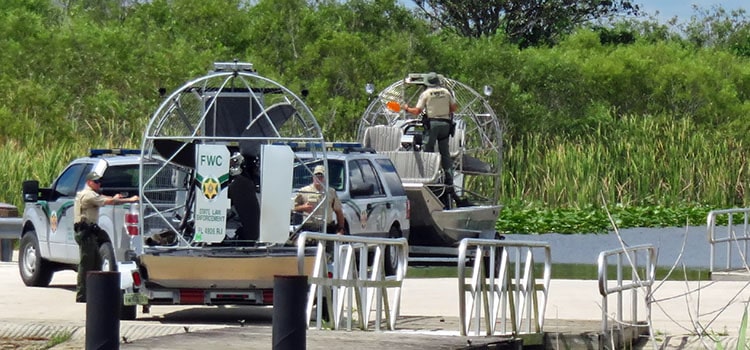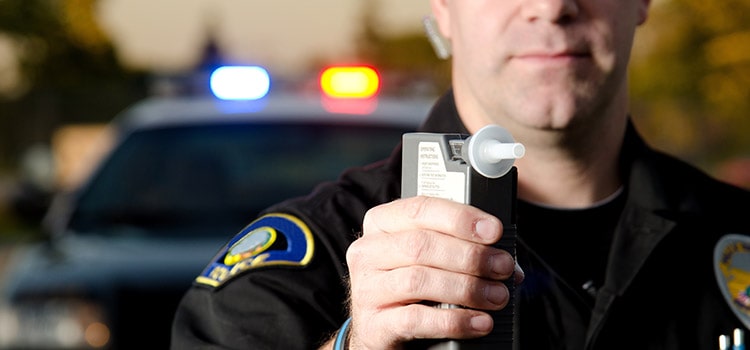In this article
What education do I need to become a police officer in Florida?
There’s seldom been a better time to enter the field of policing in Florida. In 2021, Florida Governor Ron DeSantis signed a bill to create the Florida Law Enforcement Recruitment Payment Program, which administers $5,000 to eligible newly employed police officers within the state.
Compared to some other states, however, Florida has a slightly more regulated process for law enforcement officers to enter the field of policing. It’s important to be understand this process if you want to successfully enter the profession and become a certified law enforcement officer in the Sunshine State.
Steps to education and certification as a Florida police officer
Determine your eligibility to be a police officer in Florida.

Prospective Florida police officers must satisfy certain eligibility requirements to be considered for the profession. This includes being a U.S. citizen and at least 19 years old, have a high school diploma or GED and not being convicted of any felonies, to name a few.
Consider getting a college degree.

Some individual law enforcement agencies may want their officers to have a college degree even if this isn’t required by the state. Furthermore, a college degree may eventually be necessary for promotion and moving up the chain of command. A criminal justice or related degree could make you an especially strong law enforcement candidate and set you apart from your competition.
Pass the Basic Abilities Test (BAT), if necessary.

This online examination is used to measure the minimum competencies needed to be a law enforcement officer in Florida. The test is 97 questions and must be completed within 1.5 hours. You can sign up and take this test through Pearson VUE. As of July 2021, anyone that is a veteran or has an associate degree or higher from an accredited college or university is not required to take the BAT.
Complete a Commission-approved Basic Recruit Program.

After the BAT, you must complete a program approved by the Criminal Justice Standards & Training Commission (CJSTC), at a Commission-certified training school. The basic program takes 770 total hours of instruction. If you want to work for state law enforcement agencies or in corrections, you’ll attend separate, specific academies for those positions.
Pass the State Officer Certification Examination.

You can only take the State Officer Certification Exam (SOCE) after completing a basic training program, unless you received an exemption from the basic training requirement. The exam is administered by Pearson VUE and takes place at authorized testing sites throughout the state. You have a maximum of three attempts to pass the test—if you fail three times, you need to retake a basic recruit training program.
Get a job with a law enforcement agency.

Once you’ve passed the SOCE, you can start applying to jobs at the law enforcement agencies you want to work for, provided you’ve met the agency’s own minimum qualifications for police officers.
The hiring process at some law enforcement agencies may alter the order of some of these steps. Some agencies may want you to apply first and then issue you a Temporary Employment Authorization (TEA) before enrolling you in a basic training program. Check with the individual agencies you want to work for to determine whether they want new recruits to complete basic training and the SOCE before or after applying for a position.
Have your employer submit your certification application & file to the CJSTC.

After getting hired, it’s up to your employer to complete the final steps of the process including a thorough background investigation, fingerprinting, drug testing and medical and psychological evaluations. Once these are complete, the employer must submit an Officer Certification Application to the Commission for review. After verifying that you are in compliance with all requirements, your application will be approved and you will be a certified police officer.
Florida police officer eligibility
If you want to start a career as a police officer in the state of Florida, you need to make sure you meet the minimum eligibility requirements:
- Be a U.S. citizen and at least 19 years old
- Have a high school diploma or equivalent education
- Not been convicted of any felony or misdemeanor involving perjury or a false statement
- Not been dishonorably discharged from the Armed Forces
These are the minimum qualifications to be a police officer—individual law enforcement agencies may and often do have additional requirements, such as requiring some postsecondary education. Even if the agency that you want to work for doesn’t require this to apply, having a college degree could set you apart from your competition and make you a more desirable candidate. A degree in criminal justice or a related field could also allow you to advance up the chain of command later in your career, as some higher-level policing positions require you to have a college degree.
“The state of Florida mandates at a minimum a high school diploma,” said Officer Nabil El Mehdaoui of the Tampa Police Department. “Some agencies mandate at least an associate degree or 60 credit hours like the city of Tampa. I’ve been seeing a trend that education is highly valued, that agencies are starting to require more education.”
Testing and training requirements for Florida police officers
If you meet the basic eligibility requirements, prospective police officers in Florida must complete a series of tests and training requirements to be considered for hire.
It’s important to keep in mind that the steps of the hiring process can vary from agency to agency. It’s best to check with the agencies that you want to work for to find out how they hire new recruits so you know what must be done in what order.
“For officers without any experience whatsoever, I divide them into two different categories. I call them the self-sponsored or the agency-sponsored,” El Mehdaoui said. “If they are self-sponsored, they apply directly to a police academy of their choice, they satisfy the requirements and they go to the police academy for six months. At the end of that, they take the state exam and once they finish it successfully, then they can apply to any police department they want to become a police officer in the state of Florida.”
Agency-sponsored recruits, on the other hand, apply directly to the agency and are sent to a basic training academy on their behalf, on the condition that they will work for that agency as a sworn officer for a certain amount of time.
“Across the state, the more common is the self-sponsored. For example in the city of Tampa, we hire on average about 100 officers a year and 20-24 of those officers are ones that we sponsor.”
Basic Abilities Test
The Basic Abilities Test (BAT)—which may be referred to as the CJBAT, which is the same thing—is an online exam developed by Florida’s Criminal Justice Standards and Training Commission (CJSTC) to measure your proficiency in six minimum competencies: written comprehension, written expression, memorization, deductive reasoning, inductive reasoning, and personal characteristics/behavior. The test is a prerequisite to being admitted to a basic recruit training program. The test is taken online through Pearson VUE. The test is 97 questions and last 1.5 hours. You must get at least a score of 70 or higher in all sections of the test.
Florida Basic Recruit Program
Police officers in Florida must attend a Commission-approved training program at an approved training center. You may be sent to a training academy by your employer after being hired, or you may need to complete training on your own before applying to jobs.
Basic recruit training programs consist of 770 hours of instruction over several months, typically six. This training must take place in person and cannot be taken online.
This basic training requirement is for new recruits. Out-of-state officers, federal officers, former members of special operations forces and previously sworn Florida police officers may be eligible for an exemption through the Equivalency of Training process.
State Officer Certification Examination
Passing the State Officer Certification Examination (SOCE) is required to become a certified police officer in Florida, whether you are a new recruit or transferring from out of state. You must complete a Commission-approved basic training program to be eligible to sit for the exam, unless you received an exemption from the basic training requirement. There are multiple versions of the SOCE exam based on what position you are seeking certification for: law enforcement, law enforcement auxiliary, corrections or correctional probation.
Like the BAT, the SOCE is administered by Pearson VUE but takes place in person at authorized testing sites. The SOCE tests you on the knowledge and skills you learn in basic training.
Getting hired and certified
After completing all these testing and training requirements, it’s time to start applying for jobs (if you haven’t been hired already).
Once you’ve landed a position, your employer will conduct the final tasks needed to confirm your certification as a law enforcement officer, if these have not been done already. This will, at minimum, include:
- Fingerprinting
- Background investigation, including drug testing
- Medical/physical examination
Some agencies may also conduct psychological evaluations or make you take agency-specific tests.
Once all requirements for certification have been met, your employer will submit an Officer Certification Application to the Commission. They will review it for compliance and issue you your certification upon approval.
Continuing education requirements
“Anyone that is already a police officer has to show that he or she has satisfied at least 40 hours of training every four years,” El Mehdaoui said. This is necessary in order to maintain their certification.
Law enforcement officers must complete training in a variety of categories, including:
- Human diversity
- Domestic violence
- Juvenile sexual offender investigations
- Discriminatory profiling and professional traffic stops
- Use-of-force
- Firearms qualification
- Misuse of electronic databases
Florida police officer salary and job outlook
Despite the fact that the employment of police officers and detective is expected to grow right at the average across all occupations through 2032—police staffing shortages nationwide could spell opportunity for those that want to enter the field.
Florida in particular has one of the highest employment levels of police and sheriff’s patrol officers, with the Miami/Fort Lauderdale/West Palm Beach metropolitan area ranking fourth in the nation among metro areas with the most officers. That same area has the highest annual mean wage for officers in the state.
El Mehdaoui pointed out that Florida police officers have unique opportunities to increase their wages. This can be done through salary incentivized continuing education.
“There is an abundance of classes in various areas of expertise in law enforcement that an officer can choose to do on their own. There’s a maximum amount of classes you can get paid for and everything else that you do is kind of on your own,” El Mehdaoui said. “In the state of Florida, you can maximize your salary incentive by $130 per month. Eighty hours of classes gives you $20 cash [per month], so however many classes you do, you can get up to $130 more per month. Which is significant if you think of it over the course of a career.”
State guides for prospective police officers
Take a look at the steps you’ll need to take to become a police officer in other states:




